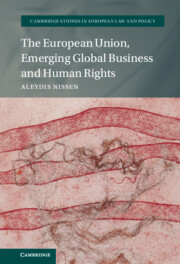Book contents
- The European Union, Emerging Global Business and Human Rights
- Cambridge Studies in European Law and Policy
- The European Union, Emerging Global Business and Human Rights
- Copyright page
- Dedication
- Epigraph
- Contents
- Foreword
- Series Preface
- Acknowledgements
- Tables of Treaties and Cases
- Abbreviations
- 1 Introduction
- Part I International Perspective
- Part II Perspective of the European Union and Its Member States
- Part III Perspective of Developing and Emerging States
- 6 Case Study
- 7 Case Study
- 8 Conclusions
- Select Bibliography
- Index
8 - Conclusions
from Part III - Perspective of Developing and Emerging States
Published online by Cambridge University Press: 10 November 2022
- The European Union, Emerging Global Business and Human Rights
- Cambridge Studies in European Law and Policy
- The European Union, Emerging Global Business and Human Rights
- Copyright page
- Dedication
- Epigraph
- Contents
- Foreword
- Series Preface
- Acknowledgements
- Tables of Treaties and Cases
- Abbreviations
- 1 Introduction
- Part I International Perspective
- Part II Perspective of the European Union and Its Member States
- Part III Perspective of Developing and Emerging States
- 6 Case Study
- 7 Case Study
- 8 Conclusions
- Select Bibliography
- Index
Summary
This book studied under which conditions the EU and its Member States influence the accountability of transnational corporations that are based in developing and emerging states for their involvement in human rights violations. Five conclusions are drawn. First, there are identifiable corporate concerns about the competitive threat of such corporations. They form a barrier to strengthening the accountability of EU-based corporations. Second, regulation has been adopted only when the ‘perceived interests’ in the EU and its Member States outweigh these concerns. Such interests are vastly different at the EU level and Member State level. Third, regulators have tried to minimise the impact on the competitiveness of their corporations by ‘extending’ their human rights regulations internationally. Fourth, bilateral agreements contain obligations relating to human rights and can serve to contribute to the creation of a ‘thick’ transnational stakeholder consensus. Local litigation is an important element in this process. Finally, there are valuable options to bring cases against corporations from developing and emerging states in EU Member States courts.
Keywords
- Type
- Chapter
- Information
- The European Union, Emerging Global Business and Human Rights , pp. 298 - 313Publisher: Cambridge University PressPrint publication year: 2022

